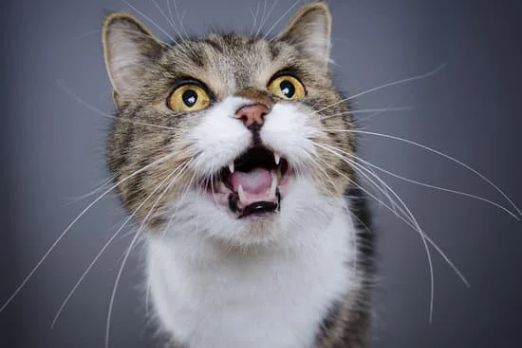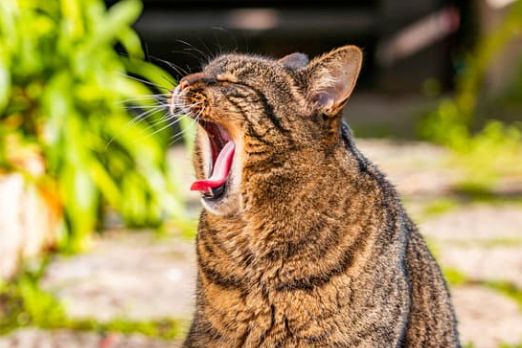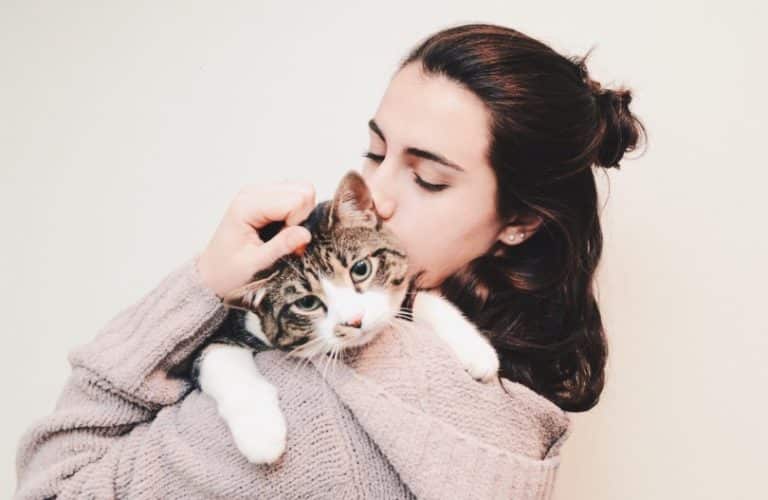Does your cat suddenly turn into a tiny opera singer? When a cat meows a lot, there’s always a message behind it—needs, feelings, or habits you can gently reshape.
Let’s decode the most common reasons and what truly helps soothe the chatter… without accidentally teaching her to meow for everything.
Curious to read your feline like a pro? Start by learning to decipher your cat’s meows and nuances with real-life examples.
Hunger
Persistent meowing next to the bowl? Classic. If mealtime is approaching—or you’re running late—she may simply be asking for her portion.
- Stick to set mealtimes (or use an automatic feeder if you’re out often). Here’s how to choose a good food dispenser.
- Weigh her meals to avoid “little extras” that add up to extra pounds.
- Offer a slow-feeder or puzzle mat to keep her busy and slow the rush.
Thirst
Cats aren’t always drawn to stagnant water, and some will meow to “tell” you they’re thirsty.
- Try a pet fountain—moving water is irresistible for many felines.
- Place the water bowl away from food and litter to encourage drinking.
- Add a bit of wet food to gently boost daily hydration.
Loneliness or a request for attention
Independent? Yes. Indifferent? Not at all. Some cats meow simply to say, “Is it our cuddle time yet?”
- Plan two or three short play sessions a day (5–10 minutes does wonders).
- Offer predictable cuddle rituals to reassure her.
- Provide high perches so she can survey the kingdom in peace.

Boredom
A bored cat often “talks.” She needs to burn energy and flex that smart little hunter brain.
- Rotate toys weekly—stash half away and bring them back later for novelty.
- Hide a few kibbles around the home for a mini treasure hunt.
- Set up a window perch to turn bird-watching into prime-time TV.
Common mistake to avoid
Rewarding the meow without meaning to. Handing a treat, opening a door, or replying instantly teaches “meow = jackpot.”
Why it backfires: behaviors that pay off get stronger. Wait for two or three seconds of quiet, then respond. Slowly extend the quiet time.
Stress
Moving, schedule changes, a new pet—our felines are routine lovers. Stress can send meows through the roof.
- Rebuild stability: safe zones, predictable hours, gentle rituals.
- Use calming pheromones and enrich the environment with hideaways.
- Avoid forced interactions; let her choose the pace.
Night vocalizing is common during stress. Here’s why your cat meows at night and how to help—no shouting, no punishment.
Original practical tip
Try a “lights-out forage trail.” Before bedtime, place 2–3 tiny food puzzles in different rooms. Only release your cat to them when the house is quiet and lights are off.
Result? She channels energy into searching and chewing, not serenading your door. Most cats settle in a few nights.
Illness or pain
A sudden, different, or more frequent meow may signal discomfort. Better to check than guess.
- Watch for clues: drinking more, peeing often, hiding, appetite changes, painful grooming.
- Call your vet if the meowing is unusual or if behavior shifts quickly.
- Never give human medication—some are highly toxic to cats.
Fun fact
Adult cats mostly meow to communicate with humans. With each other, they prefer postures, looks, scents, and hisses—the “meow” is a special human-feline dialect.
Other angles to consider
- Heat: intact females can become very vocal during cycles.
- Territory: indoor cats near a busy window may “talk” to mark presence.
- Chatty breeds: Siamese and relatives are famously talkative.
When to worry—and what to do
If meowing comes with pain, litter issues, weight loss, or lethargy—or ramps up with no clear reason—see your vet.
Otherwise, work on routine, enrichment, and consistent responses. For a step-by-step plan, read our guide on what to do when your cat meows incessantly.
FAQ
Why is my cat suddenly meowing for no reason?
There’s usually a trigger we miss: a new smell, an outdoor cat passing by, or a subtle routine change. Also check food, water, litter, and pain.
How do I stop my cat from meowing at night?
Play in the evening, offer a small wet-food snack, and ignore meows while rewarding quiet moments. Rule out stress and health issues.
Should I scold my cat for meowing too much?
No. Scolding increases stress—and meowing. Reward calm and answer needs on your terms, not on demand.
Do senior cats meow more?
They can. Arthritis, hyperthyroidism, or cognitive changes may boost vocalizations. A vet check helps relieve discomfort and adapt care.







